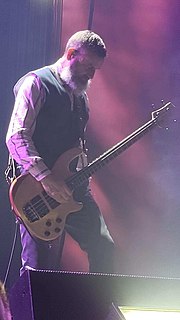Top 35 Quotes & Sayings by Justin Chancellor
Explore popular quotes and sayings by an English musician Justin Chancellor.
Last updated on April 14, 2025.
It's very rare that we play a gig and we all come off and say 'That was great, I had a great time!' There's always someone that's had a bad time. So the goal is always to achieve the next level of performing the piece that you've written. You're looking for something that you haven't even captured on the album.
I'm still like a little kid about it, where I'm just so happy and excited that people want to come to our shows and watch us play. I still go outside the venues and take a picture of our name on the marquees. I still feel like I'm trying hard to be in a good band, I really do. And I think that's a healthy approach.




















